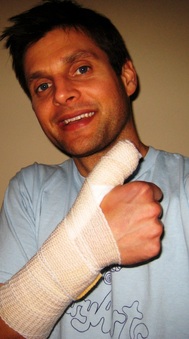 Possibly the most confidently doubtful expression of all time (photo courtesy of Viewminder) Possibly the most confidently doubtful expression of all time (photo courtesy of Viewminder) Doubt has one purpose: to weaken belief in yourself. Unlike an inner voice that keeps you safe or an analytical mindset that weighs options and looks for improvements, doubt offers no advantages and destroys confidence. So yes, flushing away doubt will preserve your happiness and belief in yourself. Read on for three ideas to accomplish this.  After closer examination, this shoe is clearly not made by Adidas After closer examination, this shoe is clearly not made by Adidas Doubt-buster #1: Examine the Evidence People can manufacture doubt with very little evidence. For example, Chris has recently begun to wonder if she is cut out for her job, which she has held for six months. She bases this on two key sources:
A more complete examination of evidence makes it almost impossible for Chris to doubt her competence. For instance, she received no orientation or training, gets little or no direction from her boss, and receives no positive feedback, only correction. She is highly educated, very intelligent, has performed well with similar tasks in past jobs, has a history of strong work relationships, and has received positive feedback from other colleagues and senior managers in her organization. The most damming evidence against Chris’ doubt is that it stems from a single source—her boss—who has turned over three other Associates in the past five years. With a thorough review of relevant details, she cannot reasonably conclude that she is unfit for her position. Doubt-buster #2: Solicit More Feedback Social feedback also has the potential to produce self-doubt. Julius recently met with an influential colleague who told him he was “too nice” and “vulnerable to manipulation,” leading him to doubt his assertiveness and qualifications to be a Director and lead teams (his long-term career goal). Although the evidence for this is limited, Julius has trouble shaking his doubt due to the strength and credibility of the source. To test the theory that he may be too nice to lead, Julius develops some questions to rate his strengths, weaknesses, vulnerability to manipulation, perceived assertiveness, etc. He then presents these questions, formally and informally, to his friends, family, and colleagues who know him well. He even deliberately tries to nudge people toward concluding that he is too passive and vulnerable. Despite his trust in the first colleague’s opinion, the majority of people who know him well reject the idea that he is weak or passive, and views his kind nature as potential for leadership strength.  Doubt-buster #3: Explain Events Favorably The way we explain events has a dramatic impact on whether we lean toward greater belief or deepening doubt. To foster confidence, we want to explain unfavorable events as temporary, with specific causes, and primarily caused by others or forces out of our control*. Conversely, we want to explain positive events as enduring, with universal causes, claiming maximum personal responsibility in the outcome. For example, Joan learns that a grant proposal she wrote has not been accepted. To ward off doubt, she can first view the event as temporary or rare—the majority of her grants do get funded, or if she writes enough proposals, eventually some will get accepted. She will also view the causes of her grant denial as specific—there is less funding and a greater volume of proposals this year—rather than universal (e.g. the business of grant writing is rigged, dying, or dead). Finally, although she will examine the quality of her efforts and make improvements in the future (if possible), she will ultimately acknowledge that awarding a grant involves many forces out of her control. However, when she succeeds in winning a grant, it happens because she is awesome. It is less important which doubt-buster you choose, as long as take some action to challenge doubts, preserve your confidence, and be fair to yourself. * This does not mean shirking responsibility for outcomes that are the direct result of our actions. When we truly do mess up, we just need to consider all of the contributing factors beyond our own actions, and firmly believe we will learn from the experience and not repeat it.
1 Comment
|
The Solutions Mine BlogAll articles written by Jason Sackett, PCC, LCSW, CEAP. Archives
July 2021
Categories |
Services |
Call310.251.2885
|
